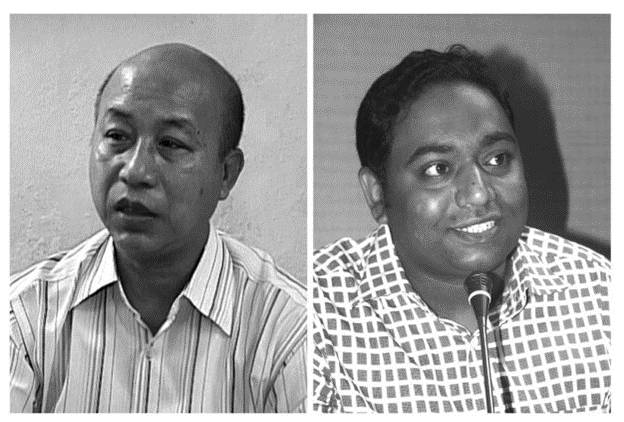
People like Arunendu Tripura and Khademul Karim Iqbal are few and far between. They belong to a select group of government functionaries who not only believe in the power of information sharing but also try to practice what they preach in support of information dissemination.

After the enactment of the Right to Information (RTI) Act in Bangladesh in 2009 many organizations have assigned officials to deliver the task of designated information official in compliance of the act. But many are yet to follow the suit.
Arunendu and Iqbal are such two designated officials who have been assigned by their respective institutions to cater to the needs of the people’s right to information. The Information Commission statistics show till mid-May 2012 as many as 9,147 officials have been assigned as designated information officials in different government offices while 2,011 in the offices of various non-government organizations.
Still hundreds of other organizations need to designate such officials so that they become fully compliant to RTI Act.
Unlike many others, who might have chosen to take the new task as ‘business as usual’ Arunendu and Iqbal took the mission with a passion. They are ready to go extra miles to quench the information thirsts of the people provided they are backed up by organizational supports and necessary training. Training not for them only but for all the functionaries relevant, on whom, at times, they (the designated officials) have to depend for getting information and deliver to the members of the public, who file RTI applications seeking the information.
They feel that if the organizations they work for adopt information disclosure policies they would be better poised to cater the information needs of the people at the same time best serving the interests of the organizations.
Obtaining a masters degree in History from the Chittagong University, Arunendu Tripura joined Rangamati Hill District Council as its public relations officer (PRO) in 1991. His office has made him ICT Focal Person and also made him the Council’s designated official to address RTI issues. In playing his role as designated official Arunendu received three RTI applications from journalists and two more from public over the last one year.
“Here people get information whenever they so require. That’s why usually they don’t require filling up RTI form to get information,” says Arunendu.
Upon receipt of forms seeking information, he moves file to his higher authorities seeking directives on getting information from other relevant departments to prepare the replies.
“As hill council has to deal with many government departments here. In preparing replies to people’s RTI applications we need to seek information from several other places. Officials concerned in many other departments sometimes say there are objections from their authorities on sharing information,” says Arunendu while explaining some of the practical constraints.
“Then I caution them (non-cooperating officials) that if I don’t get the information from them and cannot satisfy the people who’ve asked for the information, they (the officials) would be in trouble too, not only me.”
Arunendu then tries to make the non-complying officials understand that if they don’t cooperate by providing information under the RTI Act, people seeking the information have got all the right to go for appeal and even can take lawful actions through the Information Commission that has got quasi-judicial power.
It would be good if training can be organized for the designated information officials of different organizations. There are peculiarities in nature of work patterns in different organizations as according to their structures. So training can make their understanding about the mandated job more clear, notes Arunendu.
Ministry-wise training can be arranged and then each of the ministries can train the people in their respective subordinate departments, he suggests.
Thanks to his previous career stint as a journalist, none other than Md Khademul Karim Iqbal would have been a better pick for the information job in the Office of the Comptroller and Auditor General (OCAG).
Iqbal is an OCAG Deputy Director (MIS), who was given the charge of manning the information desk where people would come and seek information by filing RTI applications.
At OCAG things were further formalized with President Md Zillur Rahman launching a media and communication cell at its headquarters on May 11, 2011. Iqbal heads the cell.
“We’ve been putting in our best efforts to comply RTI since the Act’s enactment in 2009. If others don’t go by books, we ring alarm bell in audit objections. So very consciously we try to follow all the government rules meticulously including RTI,” says Iqbal.
Courtesy USAID Bangladesh’s Promoting Governance, Accountability, Transparency and Integrity (PROGATI) Program, the Management and Resources Development Initiative (MRDI) organized numerous RTI-awareness and capacity building trainings, seminars.
Iqbal has the privilege to take part in some of those programmes including the one organized to streamline OCAG’s media outreach.
Thanks to his academic background in communication, work experience in the field of journalism and wide exposures to various RTI related training and workshops in recent months, Iqbal now proactively works for promoting the causes of people’s greater access to information.
“We’ve assigned designated information officials in all of our subordinate offices including 10 audit directorates. We uploaded all RTI-related information in our website. And now work is underway to draft a disclosure policy,” says an enthusiastic Iqbal.
He notes, “People have tendency to get information from us informally, verbally. However, one organization and 8 journalists sought information from us through RTI applications over the last one year. Not a single case of appeal was registered against us as we furnished them with their required information on time.”
“Besides”, he adds, “We’ve pro-actively posted many of our reports on our website for members of the public to have easy access.”


